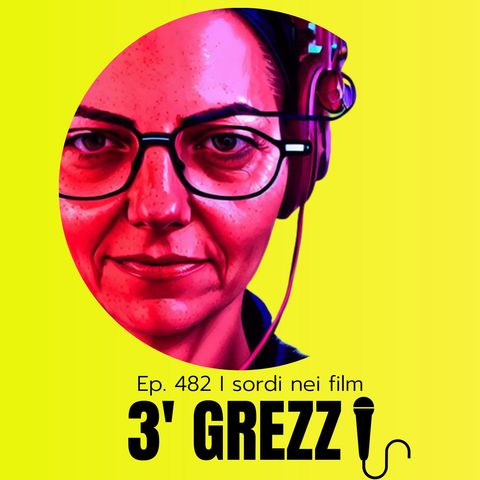3' grezzi Ep. 482 I sordi nei film

Iscriviti gratuitamente
Ascolta questo episodio e molti altri. Goditi i migliori podcast su Spreaker!
Scarica e ascolta ovunque
Scarica i tuoi episodi preferiti e goditi l'ascolto, ovunque tu sia! Iscriviti o accedi ora per ascoltare offline.
3' grezzi Ep. 482 I sordi nei film
Descrizione
Pare che negli ultimi tempi i film di cassetta abbiano cominciato a presentare trame dove anche i sordi possono raccontare le loro storie senza pietismi. Grazie anche a quel bel...
mostra di piùTRASCRIZIONE
Buone notizie per la comunità dei sordi. Se avete mai ascoltato uno dei miei 3 minuti grezzi, saprete che non si dice 'non udenti', così come non si dice 'non vedenti' perché sono persone in positivo che non si devono definire usando il negativo.
Quindi, dicevo, ottime notizie per la comunità dei sordi perché pare che la rappresentazione dei sordi, almeno nei film hollywoodiani, stia migliorando. È dai tempi di Figli di un dio minore, un film del 1986, che non si vedeva la rappresentazione dei sordi in modo così positivo. E mi sto riferendo al film che ha vinto tre premi Oscar, il titolo originale era CODA, che significa 'Child of Deaf Adult', quindi, figlio di un adulto sordo, tra l'altro è un film che gli americani hanno scopiazzato da un divertentissimo film francese, La famiglia Bélier, del 2014 che aveva esattamente la stessa trama.
Sì, è stata condotta un'indagine, un sondaggio, sempre tra la comunità dei sordi degli Stati Uniti, e questi hanno detto che effettivamente si sentono maggiormente rappresentati e non sempre in negativo.
Diciamo che siamo lontano dal momento in cui le persone con una disabilità verranno incluse in modo naturale, senza bisogno che siano lì per parlare della loro disabilità. Già si vede qualche volta nelle serie, sempre statunitensi, non mi ricordo quale serie, ma c'è un'analista che lavora al computer, o che fa le analisi nel laboratorio, questi qua di gente che muore ammazzata e che bisogna scoprire chi è il colpevole, e in una di queste serie ho notato con piacere che la persona addetta a fare le analisi è su una sedia a rotelle, e mai durante il film, il telefilm si è parlato del fatto che sia sulla sedia a rotelle, così come di solito non si parla che una persona ha i capelli rossi o che usa le scarpe a punta.
Per quanto riguarda invece i film e le serie tv italiane, che confesso vedo molto, molto di rado, però qui in Italia ancora noto una certa reticenza, anzitutto a utilizzare un linguaggio positivo, e tutti continuano a dire 'i non vedenti' perché si vergognano di dire 'ciechi' e poi a far recitare le persone in tutte le loro varietà, così come in tutte le possibili e immaginabili varietà le persone esistono nel mondo reale. Però dai, piano piano ci arriveremo anche noi, noi siamo circa 15 anni in ritardo, però ci arriveremo anche noi.
TRANSLATION
Good news for the deaf community. If you have ever listened to any of my 3-raw-minute podcast, you will know that you shouldn't say 'unable to listen' just as you shouldn't say 'unable to see' as they are people in the positive who should not be defined using the negative.
So, as I was saying, very good news for the deaf community because it seems that the representation of the deaf, at least in Hollywood movies, is improving. It has been since Children of a Lesser God, a 1986 film, that we have not seen the portrayal of the deaf in such a positive way. And I'm referring to the movie that won three Oscars, the original title was CODA which means 'Child of Deaf Adult,' by the way it's a movie that the Americans copied from a very entertaining French movie, The Bélier Family from 2014 that had exactly the same plot.
Yes, a survey was conducted, this too among the deaf community in the United States, and they said that they actually feel more represented and not always in a negative way.
Let's say we are far from the time when people with a disability will be included naturally, without needing them to be there to talk about their disability. Already you see it a few times in TV series, always U.S., I can't remember which series, but there is an analyst working on computers, or in the laboratory, you know, the shows where people are murdered and they find out the murderer, and in one of these series I noticed with pleasure that the person in charge of doing the analysis is in a wheelchair, and never during the movie, the TV show was there any mention of the fact that she is in a wheelchair, just as usually there is no mention that a person has red hair or uses pointy shoes.
On the other hand, as far as Italian movies and TV series are concerned, which I confess I see very, very seldom, anyway, here in Italy I still notice a certain reticence, first of all to use positive language, and everyone keeps saying 'unable to see' because they are ashamed to say 'blind' and then to allow people to act in all their varieties, just as in all possible and imaginable varieties of people exist in the real world. You'll see, slowly slowly we will get there too, we are just about 15 years late, but we'll get there eventually.
LINK
3' grezzi Ep. 161 Ciechi dove spiego perché 'cieco' e non 'non vedente' https://www.spreaker.com/episode/45281453
CODA https://it.wikipedia.org/wiki/CODA_-_I_segni_del_cuore
La famiglia Bélier https://it.wikipedia.org/wiki/La_famiglia_B%C3%A9lier
Figli di un dio minore https://it.wikipedia.org/wiki/Figli_di_un_dio_minore
Lo studio sulla rappresentazione dei sordi nei film https://downloads.ctfassets.net/4ivt4uy3jinr/6TDIhMpZdL9iILN2CcNnbn/3e601d88e31a0c00c7c3487d2e72497c/Deaf_Representation_Report.pdf
Un articolo su Variety dedicato all'argomento https://variety.com/2023/film/news/deaf-representation-hollywood-animation-video-games-kids-tv-1235582543/
Informazioni
| Autore | M. Cristina Marras |
| Organizzazione | M. Cristina Marras |
| Sito | - |
| Tag |
Copyright 2024 - Spreaker Inc. an iHeartMedia Company
